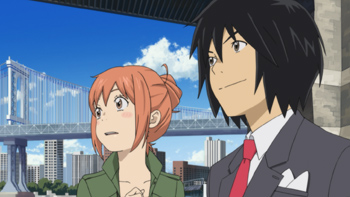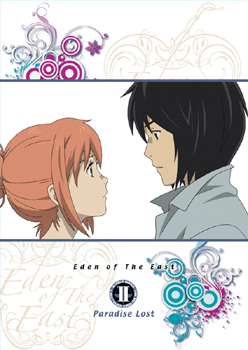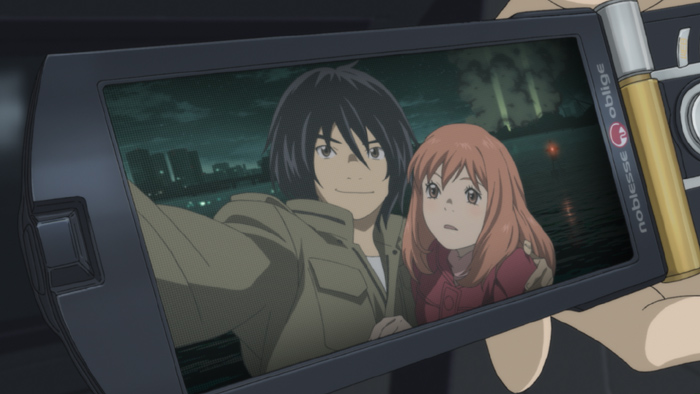 Akira Takizawa and Saki Morimi take a photo together on a fateful day in a scene from KING OF EDEN, the first of two EDEN OF THE EAST theatrical films. Photo courtesy of FUNimation Entertainment. © 2009 EDEN OF THE EAST.
Akira Takizawa and Saki Morimi take a photo together on a fateful day in a scene from KING OF EDEN, the first of two EDEN OF THE EAST theatrical films. Photo courtesy of FUNimation Entertainment. © 2009 EDEN OF THE EAST.A Look at the Anime Films KING OF EDEN and PARADISE LOST Author: Elliot Gay Official Site: juiz.jp (Japan), funimation.com/edenoftheeast (US) Special Thanks to Jackie Smith and Manny Alcala SPOILER WARNING: This article contains plot details for two recent movies.
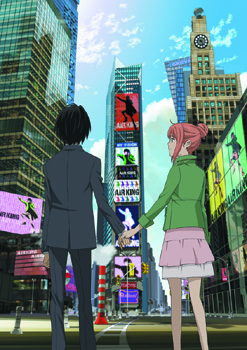 Key art for EDEN OF THE EAST THE MOVIE 1: KING OF EDEN. Photo courtesy of FUNimation Entertainment. © 2009 EDEN OF THE EAST.
Key art for EDEN OF THE EAST THE MOVIE 1: KING OF EDEN. Photo courtesy of FUNimation Entertainment. © 2009 EDEN OF THE EAST.Your mileage when watching EDEN OF THE EAST THE MOVIE 1: KING OF EDEN (????? ????The King of Eden, Higashi no Eden Gekijooban I: The King of Eden, 2009) and EDEN OF THE EAST THE MOVIE 2: PARADISE LOST (????? ???? Paradise Lost, Higashi no Eden Gekijooban II: Paradise Lost, 2010) will vary based on how much you enjoyed the series that came before. The elements that you enjoyed in the show’s run on television, such as the high animation quality, well composed music and likable characters are still the same as ever. However, if you found yourself disagreeing with the writing or any of the above elements, these movies will do little to change your mind. In a few words, it is simply more of the same. Is that necessarily a bad thing however? In my opinion, EDEN OF THE EAST (2009) was one of the freshest animated television shows airing on TV at the time of its release. Fleshed out characters, a real sense of mystery and supremely high production values made each episode a thrill to watch (for me at least). I would have initially taken points off for the anticlimactic way in which the TV series ended, but knowing ahead of time that the story was to be concluded in a pair of movies made it significantly easier to deal with in the long run. I won’t bother with an in depth synopsis here because the people who will read this more than likely understand that much of EDEN OF THE EAST’s charm is in its twist ridden plotline. That was true of the series and it’s true of both films. KING OF EDEN picks up immediately following the end of the series, with its opening credit sequence recapping the events that followed soon after Takizawa had the incoming missiles shot down and his memory erased via his phone. Saki is pulled away and Takizawa disappears off to America where he becomes famous as the ‘air king’ for saving the world from another “Careless Monday”. What follows is Saki’s quest to find Takizawa, help him get his memories back and eventually win the Selecao game once and for all. PARADISE LOST appropriately continues after the dramatic events of KING OF EDEN’s finale.
Of course the story goes a lot further than that, with multiple plot threads and character arcs that fall outside of the initial “beat the other Selecao” concept. To spoil those however would be to spoil the meat of the film. I apologize if a lot of what is in the synopsis seems foreign; let it be known that this is not a film for someone who isn’t familiar with the TV series. In fact, even if you have seen the entirety of EDEN OF THE EAST, I would recommend going back and watching it one more time. I found myself having to reference episodes for important details that I had forgotten as it had been so long since my last viewing. These films are for fans of the series, and fans of the series only. It’s unfortunate that the films are completely inaccessible for non-fans, but realistically speaking there was never any way they could have been in the first place. The series ends on such a huge cliffhanger that would inevitably lead to a whole new plot thread. The writing here is as solid as it was in the show, though due to the extended episode nature of the both films, sometimes the pacing is a bit off. There are long periods of characters discussing their next moves and while this was never really a problem in the series, it does become a problem in the feature length films. It was never enough to ruin the experiences, but it is noticeable.
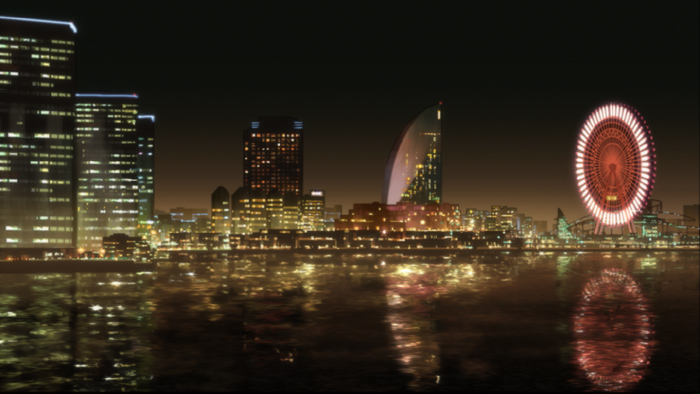 The beautiful Yokohama at night. Photo courtesy of FUNimation Entertainment. © 2009 EDEN OF THE EAST.
The beautiful Yokohama at night. Photo courtesy of FUNimation Entertainment. © 2009 EDEN OF THE EAST.The social commentary is still here in spades however, as the filmmakers take an interesting position on the NEET crisis in Japan and what it means/why it exists. I find this franchise fascinating due to its ability to accept that there is a problem in the first place and make some statements about it. The fact that a good chunk of the supporting cast are NEETS themselves is certainly just as interesting in the films as it was in the series. The premise continues to have a lot of ‘oomph’ behind it as the players of the game are tasked with fixing Japan essentially. Is there any simple way to ‘fix’ a nation? Can money alone really lead to change? The antagonist role in the films is also questionable: is he an antagonist or someone vying for change of a different kind? Takizawa’s final encounter in PARADISE LOST lacked the explosions and action of the TV finale, but the writing is sharp and throughout the sequence one wonders what the end result will be if any. Animation studio Production I.G. continues its track record of producing beautiful visuals with this pair of EDEN OF THE EAST films. Background art is vivid and alive with details, reflective of their real life counterparts. In particular, the sequences early on in KING OF EDEN are gorgeous. Character designs across the board remain attractive and inviting. Despite the urgency and seriousness of the story being told, the character visuals keep things from feeling overly dramatic or sappy. The story is of course melodramatic but the visuals do a lot to help that from interfering with the tale being told.
Kenji Kawai (GHOST IN THE SHELL, ULTRAMAN NEXUS, DEATH NOTE, ULTRAMAN ZERO: THE REVENGE OF BELIAL, GANTZ) continues the work he performed on the television series here. While I can’t say it’s as good as some of the other work he’s produced, his work on these two films are serviceable. Inoffensive and rarely intrusive, the music is simply there, supporting the scenes from the background. That of course is both a good and a bad thing as I felt at times that the score could have used a few memorable tracks. Something that will no doubt be either hit or miss with the fans is the overall conclusion. After being led along for so long regarding the Selecao and the truth behind Takizawa’s past, I have a feeling there will be a fair amount of people disappointed with the revelations made in PARADISE LOST. I thought that they worked well in the context of the whole series, but I won’t deny that I was a bit surprised with the direction the final film went in. At the end of the day, KING OF EDEN and PARADISE LOST act as the second half of the EDEN OF THE EAST television series. If you liked the first twelve episodes, you will more than likely be satisfied with at least some elements of the films. The production values remain high on all accounts and the characters are still just as likable. The films also tie up nearly every loose end left behind in the series. Whether or not they do it in the way you wanted them to is another story entirely though. Both films have been picked up for release in North America by FUNimation Entertainment, with KING OF EDEN scheduled for Blu-ray and DVD on April 26, 2011.
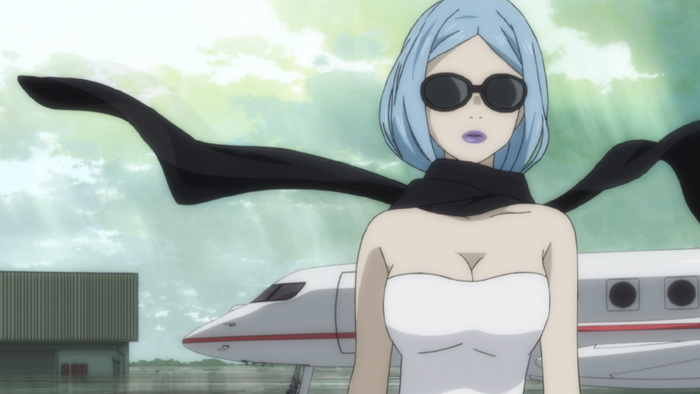 Selecao No. 11 Kuroha Diana Shiratori helps Saki and Takizawa despite their differences. Photo courtesy of FUNimation Entertainment. © 2009 EDEN OF THE EAST.
Selecao No. 11 Kuroha Diana Shiratori helps Saki and Takizawa despite their differences. Photo courtesy of FUNimation Entertainment. © 2009 EDEN OF THE EAST.For more information on EDEN OF THE EAST please see the earlier coverage here on SciFi Japan:


